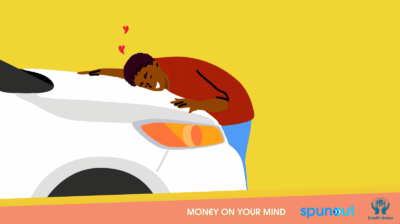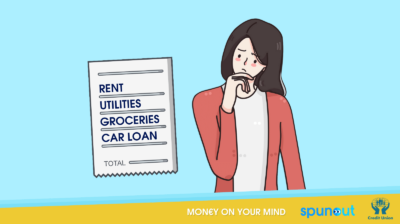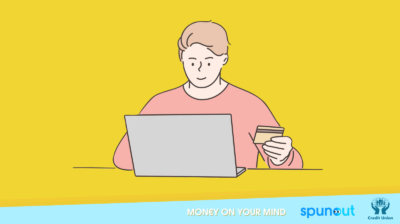Should I get a credit card?
Before getting a credit card, it is important to know what you are signing up for
Written by spunout
Factsheet
Fact checked by experts and reviewed by young people.

A credit card is basically a type of loan. It allows you to make purchases which you can repay at a later date. You can apply for a credit card once you are 18 and have an annual income above a certain amount.
Credit cards are an expensive way to pay for things. However, credit cards can be helpful for certain purposes. If you pay your balance in full each month, you will avoid interest charges. A credit card is one way you can build your credit score if you hope to get a house or loan in future. It can also allow you to afford expensive items by paying them off over time. However, if you are already in debt or find it difficult to manage your money, a credit card might not be the best option for you.
In this article:
- Things to consider before getting a credit card
- How do I apply for a credit card?
- Interest and fees
- What can you do if you have credit card debt?
Things to consider before getting a credit card
Credit cards can be very useful in certain situations. However, it is important to know what you are committing to when you apply for and use a credit card.
Questions to ask before getting a credit card
- Do you have a specific reason for getting a credit card?
- Have you thought about what you can afford to pay back each month? Can you clear the balance each month?
- Do you know what your credit card limit will be?
- Do you know how much interest you will be charged?
- Do you have any other outstanding loans?
- Is a credit card the right way to pay for the planned purchases, or would using savings, waiting, or a personal loan be more suitable?
- Have you checked your credit history (record of your spending and borrowing practices) by applying to the Central Credit Register?
How do I apply for a credit card?
To apply for a credit card, you will need to contact a credit card provider. You can apply for a credit card with the bank you have a current account with, or you can go elsewhere. Before doing so, it is a good idea to compare the different interest rates and card features from Ireland’s main providers so that you can choose the card that best suits your needs.
To apply for a credit card, you must:
- Be 18 or over
- Have an annual income over a certain amount
- Have a good credit history
- Be able to provide ID and proof of address
Once a credit card company accepts you, you will be sent out a credit card, which you can then use for purchases and cash withdrawals.
How much can I buy with a credit card?
The credit card company will set a maximum spending limit. This spending limit depends on your income and on the credit card company’s policies on limits.
You can spend up to the maximum limit over a long period of time or all at once. However, once you have spent your limit, you will not be able to put anything else on the card. You will need to pay at least the minimum amount that you owe to continue using the card.
Your credit card company cannot increase or decrease your limit without informing you.
What is a credit card statement?
The credit card provider will send you a statement each month. This statement will outline:
- The amount you spent since the last statement, and what you spent it on
- The total balance, which is the amount you owe
- The minimum payment you must pay this month. Minimum payments vary, but they are usually between 2-5% of the total amount owed
- Any cash you withdraw with your credit card
- The interest that is due
Interest and fees
Interest is the fee the credit card company charges you for borrowing money. This is known as the annual percentage rate (APR).
How much interest will I be charged?
Credit card companies will charge interest if you do not pay your bill in full before the due date. APR can be between 13 and 23%. Different credit card companies charge different rates, so try to shop around for the best deal.
You have the option to make a minimum payment towards your credit card debt each month. This is the lowest amount you must pay each month on or before the due date. However, if you are in a position to do so, it is worth paying off the balance in full every month. This will help you to reduce your debt as quickly as possible. It will also reduce the amount of interest that you pay over time as you are charged interest on the amount that you have left to repay.
What is an interest-free period?
If you pay your bill in full before the due date, you will not be charged any interest. This period of time is known as the interest-free period. It is important to be aware that most credit card companies do not have interest-free periods for cash withdrawals. This means that if you withdraw money on your credit card, you will immediately start to receive interest charges.
If you only pay off part of your bill, you will be charged interest on the remaining balance. For example, if you pay €500 off a €1000 credit card debt, you will be charged interest on the remaining €500.
Do I have to pay fees on my credit card?
If you own a credit card, there are some fees that you might need to pay throughout the year. These include:
- Stamp duty fee: All credit card owners must pay government stamp duty for each credit card they own at the start of April each year
- Over credit limit fee: This is a fee charged for going over your credit limit
- Cash advance fee: This is a charge made every time you withdraw cash
- Late payment fee: You will have to pay this extra charge if you are late in paying the minimum payment
- Unpaid item fee: You pay this if your payment is returned, i.e. if a cheque bounces or a direct debit does not go through
- Foreign exchange fee: This is a charge for every transaction or cash withdrawal not in euros
Why do people switch credit card companies?
Some people switch credit card companies to take advantage of lower interest rates. However, it is important to note that this lower interest rate generally only applies for a short period of time after you move your debt from one credit card company to another. You should also close your old credit card account after you transfer to a new company. Otherwise, you will be charged stamp duty on the old account every year.
What can you do if you have credit card debt?
Having credit card debt can be very challenging, particularly if you are finding it hard to pay back what you borrowed. If you are worried about your credit card debt, it is important to know that you are not alone. There is plenty of support available to help you with debt management.
Make a long-term plan
If you are trying to pay off credit card debt, it is a good idea to look at what you are currently spending your money on. Once you have a clear idea of where your money is going each month, see if there are any expenses you can remove or reduce, even if just temporarily. These could be memberships, subscriptions, takeaway coffees, or other non-essential purchases. Reducing your monthly expenses will help you to pay off your debt faster.
Food and healthcare are two things that are necessary in order to stay well. While you might be able to reduce the cost of your food and healthcare bill by making certain choices, it is important to continue to look after your wellbeing. If you find that you cannot afford these essentials, it is a good idea to seek support. Details on some of the support services available can be found below.
Contact MABS for advice
The Money Advice and Budgeting Service (MABS) is a free, independent and confidential service that helps people to deal with debt. If you have debt and need some guidance, MABS can offer impartial advice online, over the phone and in person.
Seek emotional support
Dealing with debt can be very stressful. If you are feeling worried or stressed about your financial situation, it is a good idea to talk to someone about it. This could be a family member, your partner, a close friend, a financial adviser or, if available to you, a counsellor.
Accessing professional emotional support does not need to be expensive. There are plenty of free and reduced cost mental health supports out there. You could also consider contacting our free and confidential text support service, 50808:
Feeling overwhelmed or want to talk to someone right now?
- Get anonymous support 24/7 with our text message support service
- Connect with a trained volunteer who will listen to you, and help you to move forward feeling better
- Free-text SPUNOUT to 50808 to begin
- Find out more about our text message support service
If you are a customer of the 48 or An Post network or cannot get through using the ‘50808’ short code please text HELLO to 086 1800 280 (standard message rates may apply). Some smaller networks do not support short codes like ‘50808’.
Need more information, advice or guidance?
We offer information, advice and guidance about the issues that matter to you. Our online Youth Information Chat service is for 16 to 25 year olds and is available Monday to Friday, 4pm to 8pm (excluding Bank Holidays).
- Chat now to a trained Youth Information Officer
- Or leave us a message and we will email you back






